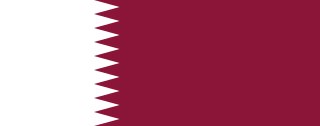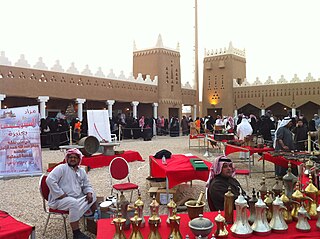Related Research Articles

The music of Qatar is based on sea folk poetry, song and dance. Traditional dances in Doha are performed on Friday afternoons; one such dance is the Ardah, a stylized martial dance performed by two rows of dancers who are accompanied by an array of percussion instruments, including al-ras, tambourines and cymbals with small drums. Other folk instruments include the oud and rebaba, both string instruments, as well as the ney.

Al-Jenadriyah is a cultural and heritage festival held in Jenadriyah near Riyadh in Saudi Arabia each year, lasting for two weeks.
"King Abdullah bin Abdul Aziz was the first to organize this festival. He fostered it and developed it to become the top Arab festival that showcases the local heritage of all Arabian Peninsula regions as well as the Saudi Arabian heritage."

Qatar, officially the State of Qatar, is a country in West Asia. It occupies the Qatar Peninsula on the northeastern coast of the Arabian Peninsula in the Middle East; it shares its sole land border with Saudi Arabia to the south, with the rest of its territory surrounded by the Persian Gulf. The Gulf of Bahrain, an inlet of the Persian Gulf, separates Qatar from nearby Bahrain. The capital is Doha, home to over 80% of the country's inhabitants, and the land area is mostly made up of flat, low-lying desert.

Amanda Palmer is an Australian-English media and film executive and international journalist, whose 18-year-career in film and media entertainment, content creation and entertainment platforms has spanned Australia, Britain, United States and the Middle East.

The culture of Qatar is strongly influenced by traditional Bedouin culture, with less acute influence deriving from India, East Africa and elsewhere in the Persian Gulf. The peninsula's harsh climatic conditions compelled its inhabitants to turn to the sea for sustenance. Thus, there is a distinct emphasis placed on the sea in local culture. Literature and folklore themes are often related to sea-based activities.

Doha is the capital city and main financial hub of Qatar. Located on the Persian Gulf coast in the east of the country, north of Al Wakrah and south of Al Khor, it is home to most of the country's population. It is also Qatar's fastest growing city, with over 80% of the nation's population living in Doha or its surrounding suburbs.

Katara Cultural Village, also called Katara, is a cultural and commercial complex in Doha, Qatar, located on the eastern coast between West Bay and the Pearl.
Sheikha Al-Mayassa bint Hamad bin Khalifa Al Thani is the sister of Qatar's ruling Emir Tamim bin Hamad Al Thani, and daughter of the country's former Emir Hamad bin Khalifa Al Thani and his second wife Sheikha Moza bint Nasser Al-Missned. Al-Mayassa was declared the most influential person in art on Art+Auction's top-10 list and ArtReview's Power 100, and prominently appears on the Time 100, and Forbes' The World's 100 Most Powerful Women. She was listed in the 'Top 100 most powerful Arabs' from 2014 to 2017 and 2021 by Gulf Business. Al-Mayassa serves as Chairperson of Qatar Museums, and it was reported by Bloomberg that her annual acquisition budget on behalf of the organization is estimated at $1 billion.

Doha Film Institute (DFI) is a nonprofit cultural organisation established in 2010 by Sheikha Al-Mayassa bint Hamad bin Khalifa Al-Thani to support the growth of the Qatari film community and to provide funding and international networking opportunities to creators. DFI hosts two major film festivals, Ajyal Film Festival and Qumra, each year. Since its inception, DFI has financially supported more than 600 projects from development through post-production.
The Doha Tribeca Film Festival (DTFF) was an annual five-day film festival that was organised from 2009 to 2012 to promote Arab and international films, and to develop a sustainable film industry in Qatar. One of Qatar's largest entertainment events, it attracted over 50,000 guests in 2010.

Qatar Museums is a Qatari government entity that oversees the Museum of Islamic Art (MIA), Mathaf: Arab Museum of Modern Art, MIA Park, QM Gallery at the Katara Cultural Village, ALRIWAQ DOHA Exhibition Space, the Al Zubarah World Heritage Site Visitor Centre, and archaeological projects throughout Qatar, as well as the development of future projects and museums that will highlight its collections across multiple areas of activity including Orientalist art, photography, sports, children's education, and wildlife conservation.

The Japan School of Doha is a Japanese international school located in Doha, Qatar.

The modern Qatari art movement emerged in the mid-20th century, as a result of the new-found wealth acquired from oil exports and subsequent modernization of Qatari society. Because of Islam's non-inclusive stance of depictions of sentient beings in visual arts, paintings historically played an insignificant role in the country's culture. Other visual art forms such as calligraphy, architecture and textiles were more highly regarded in the Bedouin tradition.
Wafika Sultan Al-Essa is a Qatari artist specializing in painting and plastic arts. She has occupied posts in Qatar TV's production department. She is one of the first females in the country to study and practice art professionally. She has been described as a pioneer of modern art in Qatar.

The Qatari Ministry of Awqaf and Islamic Affairs (AWQAFM) is a Qatari government agency also known as the Ministry of Endowments and Islamic Affairs and the Qatar Awqaf Authority. AWQAFM was created in April 2022 with the stated aim of "ensuring that all areas of modern life comply with the principles of Islam."
Mohammed al-Ajami, is a Qatari poet who was imprisoned between 2011 and 2016 on state security charges. Prior to his arrest, he was a literature student at Cairo University. On 29 November 2012, he was sentenced to life imprisonment, a sentence commuted in March 2016 through royal pardon.

Sheikh Faisal Bin Qassim Al Thani Museum is a privately owned museum located in the municipality of Al-Shahaniya in Qatar. Encompassing an area of 530,000 m², the three-building museum was opened in 1998 by Sheikh Faisal bin Qassim Al Thani.

Cinema in Qatar is a relatively young industry that evolved as part of the country’s plans to develop different local sectors with the aim of accumulating international recognition and status. Many major steps were taken to implement a long-term plan to develop the infrastructure as well as giving opportunities to local talents to have a platform that establishes their presence within the film industry with the support of the Doha Film Institute, and their various grants, workshops and festivals. The Qatar National Vision 2030 has three major pillars to development: human, social economic and environmental; this vision provides frameworks that enable the development of different elements within Qatar and its society; one of which is the high importance put on developing and cultivating artistic talents to represent and define Qatar on a global scale. Another important element in developing the movie industry is the influence and vision of Sheikha Al Mayassa who founded Doha Film Institution; the establishment of film as a mode of storytelling was imperative because it serves the purpose of granting Qatar a global presence through the talents that are supported and cultivated because of her initiative. The film industry plays a role in amplifying the Qatari national identity alongside the identity of the Arab world as a whole.

Abdullah Al-Salem (Arabic: عبدالله السالم, romanized: eabdallah alssalim. Abdullah Al-Salem was born in 1975, in Doha and lived in the Kingdom of Saudi Arabia, the United Arab Emirates and Jordan. In Qatar, he held the position of Director of the Doha International Center for Dialogue of Religions. He writes on his website and the literature of his literary works, Including poetry, literary criticism, short stories, articles and letters.He holds a master's degree in law and currently holds a PhD in family law. He also wrote articles for the Burooq and Al Jasra magazine, and participated in many festivals and evenings in Qatar. He published a critical book entitled: The Poetry Defects: A Critical Study in Building the Contemporary Nabati Poem.
Abd al-Rahman Mannai a playwright and director, born in Qatar in 1948, he obtained the technical Secondary School - Electricity in 1969, some specialized courses, and English-language courses.
References
- ↑ "افتتاح فعاليات مهرجان الدوحة الثقافي". 2020-09-21. Archived from the original on 21 September 2020. Retrieved 2022-04-25.
- ↑ "يقام بمشاركة فنية وثقافية عربية واسعة * انطلاق فعاليات مهرجان الدوحة الثقافي باوبريت "بر وبحر".. الاربعاء". 2022-03-31. Archived from the original on 31 March 2022. Retrieved 2022-04-25.
- ↑ "مهرجان الدوحة الثقافي". 2022-03-31. Archived from the original on 31 March 2022. Retrieved 2022-04-25.
- ↑ "الإعلان عن فعاليات مهرجان الدوحة الثقافي السادس - جريدة الغد". 2022-03-31. Archived from the original on 31 March 2022. Retrieved 2022-04-25.
- ↑ "The best festivals in Qatar that every expat should visit | Expatica". 2021-12-14. Archived from the original on 2021-12-14. Retrieved 2022-04-25.